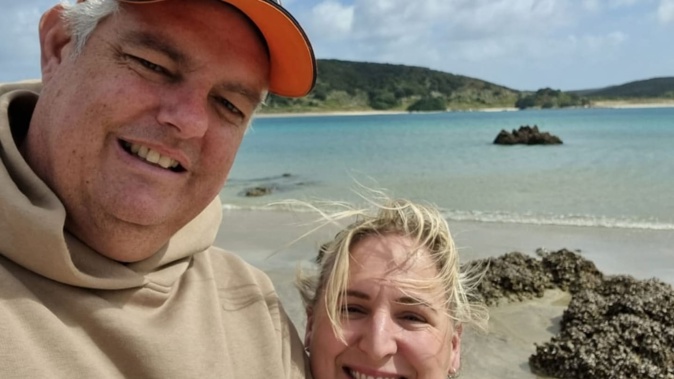
Multiple myeloma patient Simon Clark helped highlight the severe lack of modern medicines funded by Pharmac for his disease. He died days before a breakthrough in funding that will see new drugs funded for blood and other cancers.
A father of four who became the face of New Zealand’s dire lack of funded blood cancer drugs has been remembered for his infectious love of life and devotion to his young family.
Clark died in North Shore Hospital on June 17, aged 48 and two and a half years after being diagnosed with multiple myeloma, a common blood cancer.
He is survived by wife Libby and children, Ethan, 16, Jacob and Liam, 6, and Eleanor, 5.
The West Aucklander was featured on the front page of the Weekend Herald in February, in a report about the desperate measures his family and friends were taking in order to fundraise for a medicine, daratumumab, he needed to stay alive, but which isn’t funded by Pharmac.
That story had a huge public response, in donations, support and pressure for change.
The minister responsible for Pharmac, David Seymour, promised reforms, and the company that makes daratumumab halved its cost for some patients.
And this week the Government announced an extra $604m over four years for Pharmac, which will enable funding of 54 new medicines, including for four different blood cancers (what drugs for which patients is to be confirmed).
Clark had paid for a few rounds of daratumumab, but this was paused when he was - following gruelling chemotherapy - accepted on to a trial for a different drug, beginning in April.
 Simon and Libby Clark celebrating the 5th birthday of Eleanor on March 14, along with their eldest Ethan and twins Jacob and Liam (held by Ethan).
Simon and Libby Clark celebrating the 5th birthday of Eleanor on March 14, along with their eldest Ethan and twins Jacob and Liam (held by Ethan).
However, the few cycles of that treatment came too late (drugs can be less effective if a person’s disease is advanced), and on June 14 the family was advised to say their farewells.
That weekend Clark - a massive Warriors fan - managed to nod in appreciation after hearing on the game’s commentary that the team had dedicated a try to him and the family.
It was standing room only at his funeral last Friday in Henderson, where those speaking - his mother Cheryll Clark, sisters Megan Johnston and Lisa Clark, uncles Kevin, Dennis and Glenn, and best mate Paul Maddox - remembered Clark as drily funny, caring, humble and intelligent, and a wonderful husband and father.
“Simon is now the face of multiple myeloma, and we are proud of him for that, he has left such a legacy,” said Cheryll, who knitted mice to sell to fundraise for his medicine.
Maddox recalled his friend’s infectious curiosity and excitement, including for technology, astronomy and space exploration (the marks from homemade rocket tests done with Ethan are still visible on the family’s fence), woodworking and 80s music and movies.
He was the ultimate pub quiz member.
“One night a question was asked - ‘What is the name of the small paper circles discarded by a hole punch?’ Simon calmly suggested it was a chad, and that it stood for card hole aggregate debris. Apparently just one of those things he’d locked in,” Maddox recalled.
“I am forever grateful to have known Simon, he was an outstanding human, as honest as the days and super loyal. He lived his own life, unswayed by others, he wasn’t afraid to tell you when you’d stepped out of line, and, equally, he’d share his happiness when things went well.
“He was always telling me which one [of the kids] was keeping him up, but you could tell he loved it. He was an involved father who loved his life, with Libby and the kids. He didn’t want for more.”
Simon and Libby Clark met in their early 20s, lived in London and came home to have a family.
Lisa Clark, who collected aluminium cans to sell as scrap to help fund her brother’s medicine, asked those gathered to play a final game of “Simon says”.
“Simon says shout out, ‘Up the Wahs!’ Simon says, ‘Put your hand on your heart’, Simon says to you, ‘I will always be there.’”
Johnston told her brother she was proud of him: “You never gave up, and by showing your story and your battle you have helped to make changes for others … now you get to rest.”
In her tribute, Libby recalled meeting Simon at an Exponents concert, living in London together “with a much-loved crew of friends”, and settling in Te Atatū before Ethan’s arrival in 2008.
In the following years, father-and-son bonding included midnight Star Wars screenings, the yearly Bathurst couch sit-in, “and seeing his dad on the sidelines of pretty much every game he played in.”
Twins Liam and Jacob were born in December 2017, and Eleanor 14 months later. Those early years were a blur, and things were just getting easier when Clark was diagnosed with myeloma on Christmas Day in 2021.
“I have no words to describe how much we were blindsided by this. We nearly lost him on Boxing Day, but miraculously he pulled through.”
Myeloma is incurable, but it can be kept below detectable levels (remission) for years by treatment and medicines.
Each combination of drugs eventually stops working and myeloma returns, more aggressively. When that happens, a patient switches to another option.
These lines of defence have strengthened and multiplied in the past decade. Newer medicines have greatly increased life expectancy from diagnosis, and more are being released and developed.
New Zealanders have been excluded from that revolution, however, because of a lack of funded drugs. Proven medicines, including daratumumab, are on Pharmac’s “options for investment” list, meaning the government drug-buying agency accepts their benefit and wants to fund them, but doesn’t have the budget.
In the lead-up to the election, National campaigned on funding 13 cancer treatments available in Australia, covering lung, liver, bowel, kidney, bladder, head and neck and skin cancers.
When announcing the policy, Health Minister Dr Shane Reti told the country’s 21,000 blood cancer patients that “we have not forgotten you”, and they were excluded only because the Cancer Control Agency needed to complete more analysis.
After Clark’s story was published in February Reti said that analysis would be done sooner. It was completed this month, and the blood cancer community is now awaiting confirmation from Pharmac as to what new medicines will be funded.
 The story of Simon Clark and his family was featured on the front-page of the Weekend Herald in February.
The story of Simon Clark and his family was featured on the front-page of the Weekend Herald in February.
The breakthrough was too late for Simon Clark, but the family is determined to keep fighting for others.
“We will not stop raising awareness of the lack of treatment available in our country. It is not good enough and must change. Simon is only 48 and a private guy. The fact he put himself out there really surprised me,” Libby said in her tribute, which was read at the funeral by Maddox.
“I cannot thank you all enough for your love and support over the last two and a half years. For the collecting of cans, the donations, gift vouchers, supermarket vouchers, sharing our plight through media and social media, food, childcare, organising raffles, concerts, mufti days, wheel days, baking and selling food, scrap metal collecting, auctions of artwork, shavings of hair.
“It continues to blow my mind that all of you went to that effort to help us. So please accept our thanks. It doesn’t seem enough. One day I hope to pay it forward.”
She was grateful for the 25 years with her “Simey”.
“I will miss him dearly, and so will our children. I miss cuddling up to him, I miss spooning with him, I miss making decisions with him, I miss texting funny stuff to get a laugh out of him. There is a void in our house. A person missing.
“I will do my best to raise our children the way you would have wanted. I will always love you. And you will not be forgotten in our house, memories or hearts. We will say good morning and evening to Daddy in heaven, we will celebrate your birthday, and Father’s Day.
“I will still talk to you - so you won’t escape me in your ear. You are gone but will never, ever be forgotten. We love you.”
Blood cancer groups pay tribute
The Clark family asked that, in lieu of flowers, people donate to Leukaemia & Blood Cancer NZ, who provided them great support.
Tim Edmonds, the organisation’s chief executive, said their sincere condolences were with the family.
“On behalf of blood cancer patients, we are so grateful to Simon and his family for sharing their story and highlighting the lack of funded medicines in NZ.”
Nichola Oakenfull, a trustee of patient group Myeloma New Zealand, said the group’s thoughts were with the Clarks.
“While we aren’t yet sure if the increase in funding will result in more myeloma treatments being funded, Simon made a huge contribution to drawing attention to the need for better myeloma treatments, and cancer treatments in general.”
Nicholas Jones is an investigative reporter at the Herald. He was a finalist for Reporter of the Year at the 2024 Voyager Media Awards, and has won numerous national media awards for his reporting and feature writing.
Take your Radio, Podcasts and Music with you









